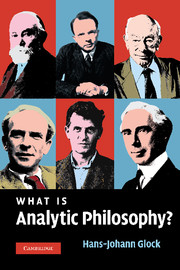1 - Introduction
Published online by Cambridge University Press: 05 June 2012
Summary
Analytic philosophy is roughly 100 years old, and it is now the dominant force within Western philosophy (Searle 1996: 1–2). It has prevailed for several decades in the English-speaking world; it is in the ascendancy in Germanophone countries; and it has made significant inroads even in places once regarded as hostile, such as France. At the same time there are continuous rumours about the ‘demise’ of analytic philosophy, about it being ‘defunct’ or at least in ‘crisis’, and complaints about its ‘widely perceived ills’ (Leiter 2004a: 1, 12; Biletzki and Matar 1998: xi; Preston 2004: 445–7, 463–4). A sense of crisis is palpable not just among commentators but also among some leading protagonists. Von Wright noted that in the course of graduating from a revolutionary movement into the philosophical establishment, analytic philosophy has also become so diverse as to lose its distinctive profile (1993: 25). This view is echoed by countless observers who believe that the customary distinction between analytic and continental philosophy has become obsolete (e.g. Glendinning 2002; May 2002; Bieri 2005).
Loss of identity is one general worry, loss of vigour another. Putnam has repeatedly called for ‘a revitalization, a renewal’ of analytic philosophy (e.g. 1992: ix). And Hintikka has maintained that ‘the survival of analytic philosophy’ depends on a fresh start based on exploiting the constructive possibilities in Wittgenstein's later work (1998). Searle is one of analytic philosophy's most stalwart and uncompromising advocates.
- Type
- Chapter
- Information
- What is Analytic Philosophy? , pp. 1 - 20Publisher: Cambridge University PressPrint publication year: 2008



